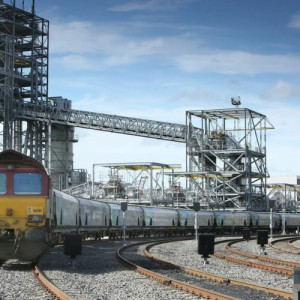Investing in Rail Freight for a Sustainable and Stronger UK


Staff Writer
The UK's rail freight operators are calling for government action to enable the sector to play a crucial role in achieving the nation's economic and environmental goals. As outlined in Rail Partners' A Greener Track report, independent research reveals that rail freight, despite being one of the lowest-carbon modes of transport, faces significant cost challenges that threaten its growth and decarbonization potential.Challenges Facing Rail Freight Operators
The report highlights that over the last decade, the cost of moving goods by rail has risen three times faster than by road[1]. This disparity, driven in part by government policy, has created an uneven playing field, making it increasingly difficult for rail freight to compete with road freight[2].
For instance, track access charges for rail freight operators have increased by 26% in real terms since 2015, while road freight operators have benefited from policies such as frozen or reduced fuel duties. Andy Bagnall, Chief Executive of Rail Partners, stated,
"Rail freight is one of the lowest-carbon forms of land transport, but with rail costs rising three times faster than road, Britain increasingly risks losing out on the benefits the sector has to offer in terms of growth and supporting government's wider missions."
The Environmental and Economic Case for Rail Freight
Rail freight offers significant benefits for both the environment and the economy. Each tonne of goods transported by rail generates 76% less CO2 than road transport.
Moreover, a single freight train can remove up to 129 HGV journeys, reducing road congestion and pollution. The economic impact is equally compelling. The rail freight sector contributes GBP2.45 (£3.014) billion annually to the UK economy, with 90% of these benefits realized outside London and the South East.
Additionally, the sector supports 6,500 direct jobs and thousands more across the logistics supply chain. John Smith OBE, Chief Executive of GB Railfreight, emphasized the importance of rail freight in supporting national missions, saying,
"There is broad consensus on the economic, environmental, and societal benefits of rail freight to us all. This report sets out the need for a level playing field between different modes of freight transport to drive growth."
A Call for Action
The rail freight sector has urged the government to take decisive action to address the cost disparity between road and rail.
This includes leveraging the upcoming legislative consultation on rail reform to implement measures to boost investor confidence and create a more favorable environment for rail freight growth. Proposed actions include retaining long-term access rights and establishing a stable charging regime. Rail Partners has also called for a framework aligned with Labour's Getting Britain Moving plan to champion rail freight growth and decarbonization.
Bagnall highlighted the sector's readiness to collaborate with the government:
"Freight operating companies want to invest in the UK and work with government to make rail more competitive, to help decarbonize the transport sector and reduce congestion on roads. But rail freight growth will not happen on its own."
Delivering on the Government's National Missions
Rail freight is critical to achieving the UK government's Plan for Change, which includes kickstarting economic growth, reaching net zero, and building new housing. For instance, one freight train can carry enough materials to construct 30 homes, directly supporting the target of building 1.5 million houses.
With regulated targets to grow rail freight by 7.5% in England and Wales and 8.7% in Scotland by 2029, a thriving rail freight sector has the potential to deliver transformative benefits for the UK economy, environment, and society.
However, as Bagnall warned, without immediate action to address cost challenges, the sector risks losing momentum in its efforts to drive growth and decarbonization.
Stay Updated with E+E Leader
Subscribe to our newsletter for the latest insights on sustainability and energy management.
Subscribe Now[3]References
- ^ The report highlights that over the last decade, the cost of moving goods by rail has risen three times faster than by road (railpartners.co.uk)
- ^ road freight (www.environmentenergyleader.com)
- ^ Subscribe Now (www.environmentenergyleader.com)